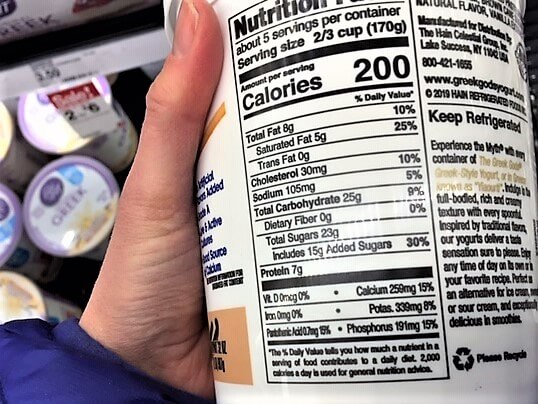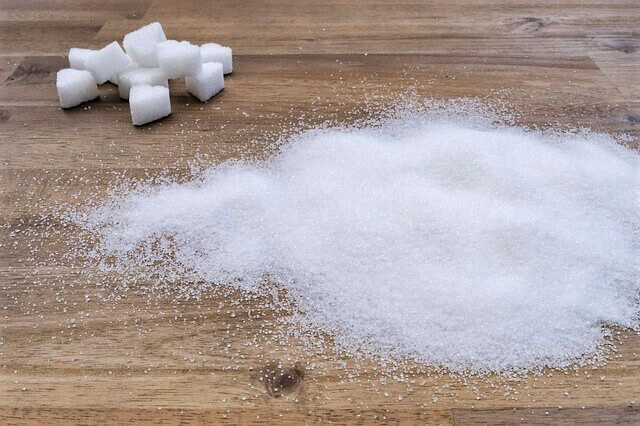Last Updated on October 27, 2021
Trying to clean up your diet? There’s no better place to start than drastically cutting back on sugar. Most of us are getting waaaaaaaay too much sugar in our diets, to the detriment of our health. Here’s what to know about why is sugar bad for you and how much sugar per day is recommended to optimize health.

How Much Sugar Per Day is Too Much and Why Should You Care?
Most people have a vague understanding that sugar isn’t good for them. But I doubt they realize just how damaging to health it is, or they wouldn’t be so willing to let kids eat sugar-filled snacks and treats on a daily basis.
Why sugar is currently considered public health enemy #1:
Besides being essentially devoid of nutrients, sugar does some really bad stuff to your body.
High intake of sugar has been shown to increase risk of obesity, which is associated with risk of several other diseases, including type 2 diabetes, heart disease (source), and cancer (source).
Sugar consumption may also increase risk of depression (source) and accelerate aging (source). Not what you want, right?
Emerging research on gut health also suggests sugar harms our microbiomes, and a malfunctioning gut affects our health in numerous ways scientists are just beginning to understand.
Sugar appears to short-circuit the body’s ability to regulate appetite, which is why it’s been implicated in the rise of obesity. Sweetened drinks and juice have been spotlighted as particularly likely to lead to excessive calorie consumption and weight gain.
If you do nothing else, cut out the sugary drinks for the sake of your health.

How Much Sugar Per Day Do You Eat? Probably More Thank You Realize
Sugar hides in some surprising places, so even if you don’t indulge often in dessert, you’re probably getting a lot more sugar than you think.
You’ll likely find sugar hiding in your pasta sauce, salad dressing, bread, and canned soup. (Here’s why you should be avoiding canned food anyway.)
It’s also added in astonishing amounts to sweetened yogurt, granola bars, and most baked goods. I was appalled to find out that school nutrition programs are serving “breakfast bars” to kindergarteners with nearly double the amount of added sugar a 5-year-old should be eating in an entire day! What are they thinking???
Most people don’t realize that when they choose something seemingly healthy like yogurt, they have to be careful, or that supposedly good-for-you food may in fact be the total opposite. Check out how much sugar is in a serving of this Greek yogurt!

Some of that sugar occurs naturally in the milk used to make yogurt, but you can see this yogurt has 15 grams of added sugar. It’s the added sugar you’re counting each day.
Is this how you want to spend your sugar allowance? I sure don’t.
And though coffee and tea can be good for you in moderation, if you add sugar or buy one of those sugar-loaded coffee drinks, you may be blowing through your sugar budget first thing in the morning.
And then of course if you have a soda or candy habit, there’s all that added sugar to consider as well. Try incredibly healthy hibiscus tea in place of soda or sweet-sour candies. It’s delicious and so good for you! Here are some other delicious sun teas you can make using herbs from your garden.
Added sugar comes in a number of forms you can find on ingredient labels, including fructose, dextrose, corn syrup, cane syrup, brown rice syrup, agave syrup, maltose, and sucrose. Be a savvy label reader and avoid these additives whenever you can.
How Much Sugar Per Day?
The American Heart Association recommends that women restrict added sugar from all sources to just 100 calories per day (150 for men). That’s only 25 grams, significantly less than one average sweetened soda! The U.S. dietary guidelines suggest keeping added sugar to 10% of calories, which would be an upper limit of 50 grams for someone consuming a 2000-calorie diet.

Important note for real foodies: Foods sweetened with honey, maple syrup, coconut sugar, and fruit may be marginally healthier than those made with refined sugar or corn syrup, but the sugar in them still “counts,” and can negatively affect your health if you overindulge.
If you regularly enjoy pancakes or waffles — even healthier homemade ones — know that when you dump maple syrup on them, you’ve likely exceeded your sugar budget for the day. A mere two tablespoons has more than 25 grams of sugar!
Stephanie Clarke, MS, RD and Willow Jarosh, RD of C&J Nutrition warn against the “health halo” that sometimes surrounds so-called “natural” sweeteners. They recommend keeping all forms of added sugar — including the dates and honey in your homemade sweets — below that 10% of calories.
So How Much Sugar Per Day Can You Comfortably Cut?
Just to be clear: I don’t advocate depriving yourself of sweets and treats!
You can greatly reduce the amount of sugar you take in with some simple swaps and still thoroughly enjoy some sweets every day. It’s all about making savvy choices.
Research shows that people who are too restrictive generally have trouble sticking with a healthy-eating plan. I’m just suggesting you limit sugar in general and really enjoy what you do have.
Personally, I like a little high-quality chocolate pretty much every day. (Chocolate’s health benefits are pretty awesome, and when you choose a high-cacao, low-sugar bar, there’s very little to feel guilty about.)
When you’re not constantly taking in sugar, a lot of desserts and candy come to seem too sweet. I’m for indulging when someone puts a gorgeous flourless chocolate cake in front of me, but not an insipid pink cupcake at a kid’s birthday party.
When I want something sweet, you’ll often find me reaching for chewy dehydrated bananas, dried peaches, or homegrown fruit (SO good!!!). I’m also constantly adding to a collection of healthied-up treats from around the blogosphere on my healthyish treats Pinterest board. The latest addition: a collection of more than 50 inspired and creative healthy smoothie recipes!
How to Cut Your Daily Sugar Intake
If you don’t already, be sure to check the labels of your favorite prepared foods. Add up your daily sugar intake, and try to keep it to 25 grams. That means you may need to rethink the “energy bar” and your flavored yogurt if you want to be able to indulge in dessert.
I think that’s a pretty easy trade-off, though. I would much rather have my homemade yogurt with some fresh fruit and save my sugar for chocolate!
Your palate may need some retraining, but soon a lot of these foods will seem too sweet. Who wants sugary tomato sauce, anyhow?
Some easy shifts to satisfy your sweet tooth without eating too much sugar per day:
♦ Cut out sweetened drinks and juices.
♦ If you buy prepared foods, choose ones with the least added sugar. Watch out for processed cereals and granola. Here’s the low-down on how to make sure your granola is actually good for you.
♦ Indulge in in-season fruit, which often tastes so good, you won’t feel the need for a sugar-filled dessert. Bowl of berries, anyone? For something a little more intensely sweet, try some dried apples or no-sugar added cinnamon apple pear leather. It’s amazing!
♦ Make your own granola bars, cookies and muffins so you can control the amount of sugar. Be generous with healthy ingredients like cacao for thoroughly indulgent but less sugar-filled treats.
♦ Try desserts that sneak in an extra serving of vegetables, like zucchini, sweet potatoes, or pumpkin. We also LOVE treats made from rhubarb, especially homemade fruit leather and this rhubarb crisp.
Here are some other options for healthy treats to satisfy your sweet tooth without wrecking your diet.
Should You Use Artificial Sweeteners?
The jury is still out on artificial sweeteners, which may have unexpected health effects, such as altering gut bacteria and predisposing heavy users to metabolic problems. Diet soda consumption, for instance, has been linked to increased risk of overweight, heart disease, diabetes and stroke. It has no place in a real food diet, anyway.
Some people feel comfortable with erythritol and stevia, some don’t. If you want to know more, here’s a balanced take on stevia products. You can also grow your own stevia and make a homemade stevia extract from it without additional chemical additives.
Here are four other healthy eating habits consider when you’re cleaning up your diet.
How about you? How much sugar per day do you usually have?
Pin to save this info on how much sugar per day is OK for later!

How much sugar per day photo credits: Bru-nO, Alehandra, StockSnap, GabiSanda

Susannah is a proud garden geek and energy nerd who loves healthy food and natural remedies. Her work has appeared in Mother Earth Living, Ensia, Northern Gardener, Sierra, and on numerous websites. Her first book, Everything Elderberry, released in September 2020 and has been a #1 new release in holistic medicine, naturopathy, herb gardening, and other categories. Find out more and grab your copy here.
 Hi, I'm Susannah, a garden geek, energy nerd, and fan of healthy food and natural remedies. Need some simple, practical solutions for living healthier and greener? You've come to the right place! More about me and my green projects
Hi, I'm Susannah, a garden geek, energy nerd, and fan of healthy food and natural remedies. Need some simple, practical solutions for living healthier and greener? You've come to the right place! More about me and my green projects